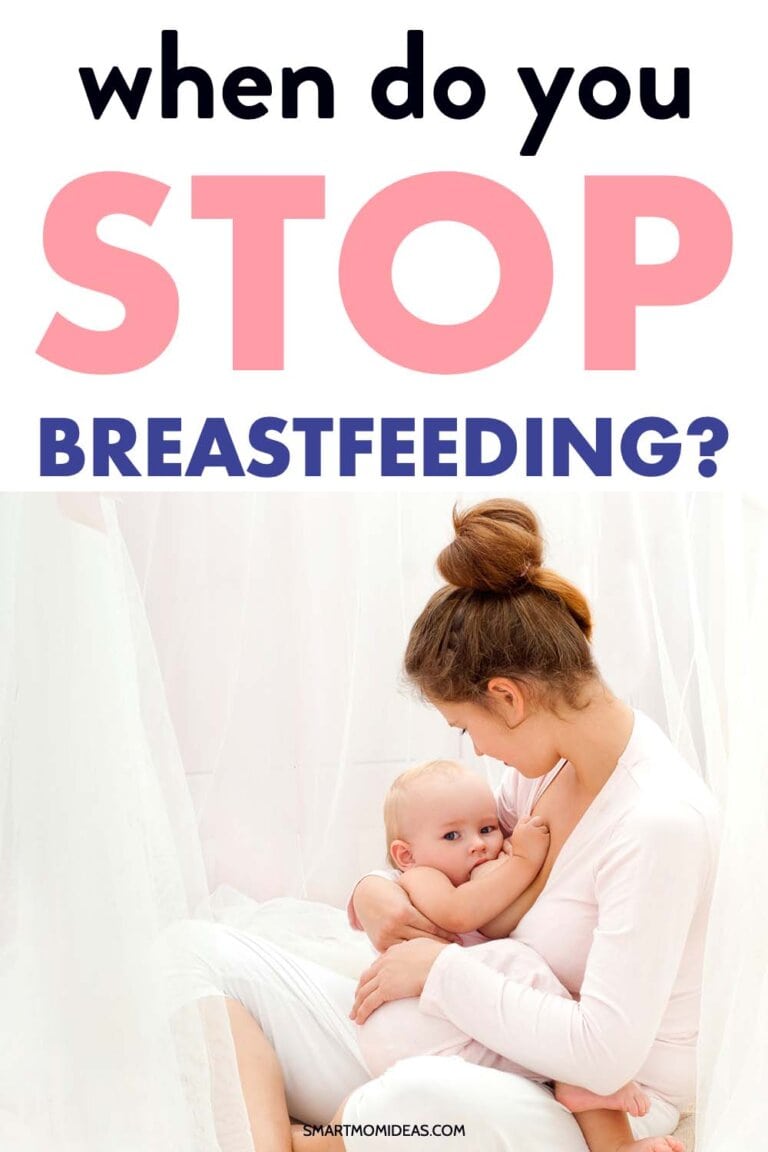Learn the cues and steps to stop breastfeeding as a new mom

Breastfeeding is a very personal choice for you and your baby. For me, my daughter took to breastfeeding much longer than my son.
My son preferred the bottle and I was okay with this. I didn’t have enough milk for my twins and had to supplement with formula and needed help feeding my twins so baby bottles were introduced from the get go.
The decision on how long and when to stop breastfeeding is also a very personal one.
Ultimately it is up to you and your baby how long to breastfeed for, when to wean, and whether extended breastfeeding is right for you.
My daughter continued to breastfeed until one and a half or so. By this time she was sleeping through the night and was eating solids. She also didn’t request breastfeeding and sort of “forgot” about it. Not every baby is like this however.
Learn what you need to do to stop breastfeeding.
When To Stop Breastfeeding
There are many factors that can contribute to the question of when to stop breastfeeding?
Even if you decide to stop breastfeeding for any reason, you can still give your baby the benefits of breastmilk by pumping and feeding.
While this might not be ideal for many moms, it might be their only option. Some babies just refuse the breast while others can’t seem to get enough. However, our bodies don’t always cooperate and sometimes you just aren’t able to hit that 6 or 12 month mark like you had hoped.
In addition, how long you breastfeed can also vary from child to child.
However, you should not be influenced by the opinions of others during your breastfeeding journey. They are your boobs, not theirs.
Breastfeeding is your choice, your baby and your body. Whether it’s several days or several years, do what you feel is right for you and your child.
Do I Need to Stop Breastfeeding?
Moms that aren’t very experienced at breastfeeding can feel that they need to stop breastfeeding for certain reasons. Going back to work for example.
There are laws set in place that protect women to be able to pump at work without the risk of losing their jobs.

In short, your employer is obligated to give you reasonable break times for 12 months after your baby is born in a place other than a bathroom that is separate from other co-workers and shielded from view to express breastmilk.
If you have concerns about being able to pump at work, speak with your HR department or manager about accommodations for nursing mothers.
Just because you go back to work, does not mean that you need or should stop breastfeeding.
You can save those special times in the evening or before you leave for work in the morning to breastfeed and bond with your baby.
Some moms might also think that if they are sick they need to stop breastfeeding.
This is a common misconception (depending on the illness of course). If you are feeling a bit under the weather, there is no need to stop breastfeeding your child. You should always, however, consult with your doctor about any concerns you might have feeding your baby while you are sick.
The Benefits of Breastfeeding

As I’m sure you already know, there are so many benefits to breastfeeding your baby. Even if you choose to only breastfeed while you are in the hospital with baby, he or she will receive vital nutrients.
Right after giving birth, your body produces colostrum, which is full of all sorts of good things to help build your baby’s immune system. Breast milk provides antioxidants, enzymes, live antibodies, and other essential nutrients that are easily absorbed by a baby’s fragile system.
Many studies have shown the numerous benefits of breastfeeding for at least the first six months of life.
There are also many benefits that moms get for breastfeeding.
Breastfeeding isn’t just beneficial within the first six months. The benefits of breastfeeding carry well into the teen and adult years.
Children that were breastfed can have fewer cavities and improved brain function while teens have a lower risk of multiple sclerosis. Adults who were breastfed as children are less likely to develop heart disease.
The benefits of breastfeeding for baby
- Stronger immune system
- Fewer colds and respiratory illnesses
- Fewer ear infections
- Lower rates of infant mortality and SIDS (sudden infant death syndrome)
- Fewer cases of meningitis
- Less diarrhea, constipation, and other gastrointestinal issues
The benefits of breastfeeding for mom
- Less absenteeism at work (due to a healthier baby)
- Less risk of postpartum depression
- Fewer UTIs
- Help in stimulating the uterus to contract back to normal
- Promotes greater weight loss after birth
- Less postpartum bleeding
- Less chance of anemia
- Increased confidence and self-esteem
- Creates a strong physical and emotional bond between mom and child
- Lower risk of cancers
Breastfeeding In Year One
Breast milk is the most important food within your baby’s first year. During the first six months, breast milk helps to promote normal and healthy growth while providing essential nutrients.
If your child weans or you make the decision to stop breastfeeding before the one year mark, you should supplement with infant formula. Cow’s milk should only be introduced after 12 months of age.
One of the many amazing and magical things about breast milk is how it changes to suit your baby’s needs.
When they are first born, your milk is mostly made up of colostrum which contains immunological components that help to protect your newborn from illness. It’s like nature’s vaccine.
The makeup of your milk changes, which includes the volumes of protein, antibodies, and fat and sugar content, as your baby gets older.
The makeup of your breast milk also changes if your baby is going through a growth spurt or is experiencing an illness.
It also changes from morning to night. During the morning hours you produce more milk at a higher flow while milk in the evening contains more serotonin to help baby get to sleep.
If you are pumping you might also realize that the color of your milk changes based on when you have pumped (before or after feeding).
The foremilk at the beginning of pumping or feeding is watery looking while the hindmilk, or the milk at the end or a feeding or pumping session, is fattier.
Even if you choose to breastfeed after one year, your breastmilk will still hold a great amount of nutritional value.
When to Wean Your Baby
There is really no average age pinpointed that babies and children wean as it is a process. Your child might naturally wean as you start to introduce more foods, or they might be a bit more stubborn.
Some children take to weaning naturally when introduced to other foods and sources of nutrition, like cups of milk. Other children might really enjoy the act of being close to their mother and that connection and comfort that breastfeeding provides.
If you are ready to wean and your child is not, don’t despair.
As children get older it can often be more difficult to wean them than when they are younger.
If they are old enough to talk and can understand you, then try and have a discussion with them about why you want to stop breastfeeding and other things you can do together to experience that closeness.
How to Wean Your Baby

At around six months you can start to introduce other complementary foods alongside breast milk.
The whole process of weaning isn’t technically complete until your baby is only eating regular food and no longer drinking breast milk. While you should continue to breastfeed or give your child breast milk until they are 12 months old, the weaning process can take longer than six months.
After you have decided when the right time is for you to stop breastfeeding, you shouldn’t stop suddenly.
Stopping breastfeeding suddenly can lead to breast engorgement (ouch) and blocked milk ducts.
It can also be difficult for your baby to physically cope with a sudden change in immune and gut response. Not to mention, it can take a toll on you both emotionally.
So take the process gradually and don’t rush it.
If you are going with a child-led weaning approach, the process will likely be gradual. Children will often take shorter feeds or will feed less frequently. This gives your body time to adapt and your milk will gradually dry up.
Each feeding can be replaced with snuggles and cuddles to perpetuate that bond and closeness you shared while breastfeeding.
Extended Breastfeeding
Many people can be uncomfortable with women who choose to breastfeed for an extended period of time. They might be criticized by their friends or family members and looked down on by “societal norms.”
According to the American Academy of Family Physicians, anthropological evidence shows that the natural age of self-weaning children range from 2.5 to 7 years of age.
Women and their children might choose to continue to breastfeed for the enjoyment, convenience, and close connection that it provides. In order to curb any type of stigma of extended breastfeeding that you might be experiencing from friends and family, try and educate them on why you and your child choose to breastfeed beyond that “normal” six to 12 month mark.
In reality, it’s none of their business and you shouldn’t have to worry about justifying your decisions to anyone.
The decision on when to stop breastfeeding is entirely yours. Don’t let others, even your significant other, influence that decision on what is best for you and your baby.
If you are going back to work make sure to check out this pumping class for you!

Over to you – have you thought about stopping breastfeeding? Let me know in the comments.




Leave a Reply